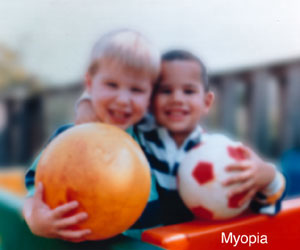LASIK is an eye correction operation that eliminates the need for external lens. Technically, it is a form of refractive surgery. This means it reshapes the cornea to correct problems affecting visual acuity. LASIK will fix astigmatism, myopia and other conditions that cause vision to blur. During surgery, Dr. Hakimzadeh at the Oakland Eye Clinic, uses a laser to cut the cornea and remodel it and fix the problem obstructing vision. Although, it sounds scary, the process is safe for most people. While all surgery carries risks, the risk of complication from LASIK surgery is considered to be a calculated risk that only rarely encounters difficulties, which are increasingly rare as technology advances and techniques improve.
Astigmatism
The goal is to improve eyesight, but LASIK can actually cause the formation of astigmatism. This is due to an over or under correction during the surgery. This is a rare occurrence. If you choose a doctor who is not experienced and board certified by the American Board of Ophthalmology.
Like Dr. Hakimzadeh, it is best to do some research and make sure there are no complaints against them and that they have a proven record of success. While the formation of astigmatism is never something patients or doctors plan or hope for, another eye correction operation can fix the astigmatism if necessary.
Infection
Infection is always a concern with any invasive procedure. Your doctor will go over aftercare procedures with you to reduce the risk. If you notice drainage or pus coming from the eye or excessive swelling, see your doctor for a follow-up.
Dry Eyes
Dry eyes are a natural side effect of the surgery. The ophthalmologist may recommend eye drops while the cornea heals. The dryness might affect vision temporarily, but should improve over time.
Medical Conditions
Providing Dr. Hakimzadeh with your full medical history is critical when considering an operation for eye correction like LASIK. Certain conditions increase the risks and affect the outcome of the procedure.
Any form of autoimmune disease such as rheumatoid arthritis increases the risks. If you take an immunosuppressant medication after an organ transplant or are HIV positive, the surgery may not be possible. Tell Dr. Hakimzadeh if you are pregnant when discussing the possibility of having LASIK surgery. People with chronic dry eyes may have difficulty tolerating the healing process.
While you may feel that you are a good candidate, Dr. Hakimzadeh will determine your candidacy and will not perform an eye correction operation on patients if it cannot be done safely. During your visit, the doctor will take a complete history, conduct a full eye exam and discuss the procedure with you. Together you can decide if LASIK is right for you. The risks are minimal and the results may be as good as 20/20 vision or better. After a short consultation with Dr. Hakimzadeh you know if LASIK is right for you, and it may be the first step on an amazing journey to perfect vision.








